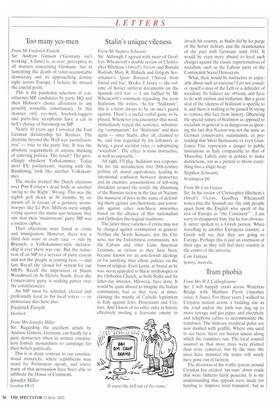Stalin's unique vileness
From Mr Stephen Schwartz
Sir: Although I agreed with most of Geoffrey Wheatcroft's double review of Christopher Hitchens's Orwell's Victory and Ronald Radosh, Mary R. Habeck and Grigory Sevastianov's Spain Betrayed ('Saved from friend and foe'. Books. 8 June) — the volume of Soviet archival documents on the Spanish civil war — I am baffled by Mr Wheatcroft's comment regarding the term Stalinism. He writes, 'As for "Stalinism-, this is a term always to be on one's guard against. There's a useful verbal game to be played. Whenever you encounter that word, immediately repeat the sentence, substituting "communism" for -Stalinism" and then again — since Stalin, after all, claimed to be, and was regarded by his followers as being, a great socialist ruler — substituting "socialism". The effect is most instructive, as well as enjoyable.'
All right, I'll play. Stalinism was responsible for the introduction into 20th-century politics of: moral equivalence, leading to intentional confusion between democracy and its enemies; assassinations of left-wing dissidents around the world; the disarming of the Russian nation in the face of Nazism; the massacre of Jews in the name of defending them against anti-Semitism; and terrorism against other non-Slavic minorities based on the alliance of Slav nationalism and Orthodox theological traditions.
The latter three varieties of crime may not be charged against communism in general. Neither the North Koreans, nor the Chinese, nor the Indochinese communists, nor the Cubans and other Latin American Leninists, as vicious as they have been, became known for an anti-Jewish ideology or for justifying their ethnic policies on the basis of religion. Even Lenin, as brutal as he was, never appealed to Slavic mythologies or the Orthodox Church, as both Stalin and his latter-day imitator, Milosevic. have done. It would be quite absurd to imagine the Italian communists, bad as they were at times, claiming the mantle of Catholic legitimism in Italy against Jews, Protestants and Uniates. And I know of no other ruler in history effectively inviting a fearsome enemy to invade his country, as Stalin did by his purge of the Soviet military and the maintenance of the pact with Germany until 1941. It would be even more absurd to level such charges against the classic representatives of socialism, such as the Labour party or the Continental Social Democrats.
What, then, would be instructive or enjoyable about such an exercise? I do not consider myself a man of the Left or a defender of socialism. Its failures are obvious, and have to do with statism and welfarism. But a great deal of the vileness of Stalinism is specific to it. and there is nothing to be gained by trying to remove this fact from history. Obscuring the special nature of Stalinism as opposed to socialism in general is as dangerous as ignoring the fact that Nazism was not the same as German conservative nationalism, or pretending that Silvio Berlusconi, or even Gianfranco Fini, represents a danger to public institutions in Italy comparable to that of Mussolini. Labels exist in politics to make distinctions, not as a pretext to throw everything into a single heap.
Stephen Schwartz
Washington DC
From Mr Con Vaitsas Sir: In his review of Christopher Hitchens's Orwell's Victory, Geoffrey Wheatcroft writes that the Spanish are 'the only people apart from the English who speak of the rest of Europe as "the Continent" . I am sorry to disappoint him, but he has obviously never spoken to a Greek person. When travelling to another European country, a Greek will say that they are going to Europe. Perhaps this is just an extension of their ego, as they still feel their country is the centre of the universe.
Con Vaitsas
Sydney, Australia
Tram phobia
From Mrs W.J. Collingboume Sir: I will happily crawl across Waterloo Bridge with Matthew Parris (Another voice, 8 June). For three years I walked to Croydon station across a building site as the road and/or the path was dug up to move sewage and gas pipes. and electricity and telephone cables to accommodate the tramlines. The hideous overhead poles are now daubed with graffiti. Where one used to see trees, there are barren spaces along which the tramlines run. The local council assured us that more trees were planted than were removed, but by the time the trees have matured the trams will surely have gone out of fashion.
The diversion of the traffic system around Croydon has created 'rat runs' down roads that were hitherto fairly peaceful. It is my understanding that appeals were made for funding to 'improve local transport', but as they were not forthcoming a 'new scheme' — trams — was implemented. As a consequence buses have now been taken off some routes served by the trams. Oh yes, a bus fare is 65p if one buys a carnet, but the same journey is 90p by tram. I am getting my knee pads ready for Waterloo Bridge.
W. J. Collingbourne
Croydon, Surrey



































































 Previous page
Previous page